Psoriasis is a non-communicable disease that affects human skin, nail plates and joints. The disease is characterized by ups and downs, aggravation and remission period. The danger of this disease is not only the discomfort it causes, but also that the disease greatly complicates life and interferes with social adaptation and normal quality of life. In severe cases, severe depression may be caused by the acute form of the disease.
How to get rid of psoriasis, what is this disease, what are the symptoms and treatment of psoriasis? You will learn this from our article.
Psoriasis: the cause
Under normal circumstances, a healthy person's skin will renew within a month. During this time, dead cells are peeled off and new cells are replaced. If the skin renewal mechanism fails, the maturation process of new cells only takes about a week, which can disrupt the cell balance. As a result, cells die faster.
In areas affected by the pathological process, immune system cells, macrophages and epithelial tissue cells proliferate excessively. Therefore, skin shedding was observed and created favorable conditions for the inflammatory process. In addition, the formation of new capillaries is accelerated, which is why the skin at the site of inflammation turns red.
Chronic psoriasis is non-infectious in nature, so the disease is considered non-infectious. It was established in the 19th century, but until now, scientists have still been unable to tell the exact cause of its occurrence.
Among the prerequisites for disease development are:
- Genetic. If a person's parents or close relatives are susceptible to skin pathology, they are likely to inherit it. This is due to certain DNA mutations found in psoriasis patients and similar mutations found in relatives.
- Gene mutation. The violation of DNA structure will not only be inherited, but will also harm relatives who do not have psoriasis, and will show up at a later time, thus affecting the skin renewal process. The cause of this genetic change is unclear.
- The immune system is weakened. Any behavior that violates the body's defense capabilities may become an incentive for the development of psoriasis.
- The metabolic process is interrupted. The metabolic changes of fat, nitrogen, carbohydrates and vitamins in psoriasis are manifested as metabolic disorders. As a result, toxins accumulate in the body, the ability to adapt decreases, and the sensitivity to infection increases. Similarly, due to metabolic disorders, the patient's serum bile acid score increases.
- External stimuli. Friction, constant contact with chemicals, wearing tight clothing, cuts and insect bites-all these can cause minor injuries on the skin, which can develop into psoriasis over time.
- Frequent allergic reactions. If a person tends to experience atypical reactions of the immune system, and manifests itself in the form of rashes, itching and rashes, then this is another opportunity for psoriasis.
- Experienced or under pressure for a long time. Any stress will weaken the body's defenses and destroy the immune system. If a person is prone to skin disease, then it can be accurately manifested at such a moment. In addition, any pressure will affect the endocrine process, so a large amount of epinephrine and norepinephrine will be released into the blood. This process affects metabolic processes and biochemical reactions and becomes a prerequisite for the development of psoriasis.
- General weakness caused by serious diseases-atherosclerosis, liver cirrhosis, diabetes, high blood pressure, etc.
- Imbalanced diet and alcoholism. If a person eats too much fatty, smoky, salty, sweet, and spicy foods, they are more likely to develop psoriasis. Similarly, in some cases, the prerequisite for the development of the disease is excessive consumption of chocolate and citrus fruits.
- Hormonal surges caused by severe changes in hormone levels after menopause, adolescence, pregnancy, breastfeeding and abortion. It is worth noting that the hormonal cause of psoriasis may have nothing to do with the above time period. In this case, we are talking about changing the function of the endocrine system organs.
- Climate change, living in unfavorable environmental conditions. If a person is prone to psoriasis and moves to a colder place, the disease will greatly worsen. The same situation applies to areas with severe air and water pollution. However, climatic factors can hardly be called the root cause of the disease: on the contrary, it is a catalyst that activates the "dormant" form of the human body's tendency to psoriasis.
How to determine if it is psoriasis: the symptoms of this disease
First of all, psoriasis is a skin disease. However, in some cases, especially severe cases, it not only affects the skin, but also affects tendons, internal organs, spine, nail plates and joints. Below we will first observe the signs of psoriasis, allowing you to distinguish psoriasis from other skin pathologies.
How does psoriasis start?
On the surface of the skin (usually on the knees, hands, elbows, back, armpits, under the breasts, underbone areas, and on the genitals), and sometimes on the mucous membranes, there will be round areas of dry redness. Initially, their size was relatively small: each papule was only a few millimeters in diameter. However, as time goes by, the diseased area increases, the papules fuse with each other and form so-called psoriatic plaques: their diameter reaches 10 cm or more.
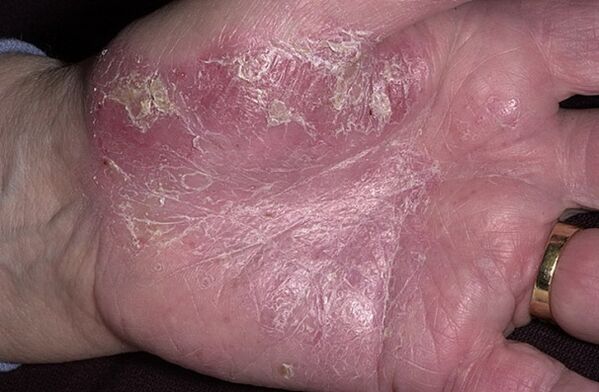
Initially, the pimples will not cause obvious discomfort to the person. They don't actually itch or itch. However, over time, as they grow and plaque accumulates, the affected area thickens and rises slightly above the healthy area of the skin. This phenomenon is accompanied by itching.
The initial stage of psoriasis is characterized by the formation of small dry scales on the affected area of the body, and the structure is loose. Their color ranges from white to pale yellow, and a pale pink edge can be seen around each plaque. From the outside, these areas are a bit like molten paraffin, so they are called "paraffin lakes".
First, the signs of psoriasis on the skin and facial skin may be confused with the manifestations of eczema or other skin lesions. The stage of psoriasis-the so-called psoriasis triad-helps to identify the type of disease.
- Stearin stage. It is characterized by the formation of typical stearic acid-like shavings, which appear when dental plaque is scraped.
- Terminal movie stage. It appears as a smooth, moist and shiny red surface under the scales.
- "Blood Dew" stage. If someone starts to scrape off the terminal membrane, small water droplets will form on its surface due to precise bleeding. In turn, this is caused by the thinning of the vascular network and the fragility of capillaries.
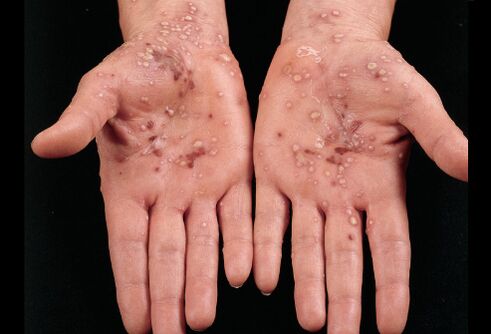
The onset of psoriasis is also accompanied by symptoms that have nothing to do with the skin. Usually, patients complain of fatigue, apathy, irritability, drowsiness, mood swings, dizziness, nausea and increased sleep problems.
In addition to skin lesions, how does psoriasis behave?
This disease not only affects the skin, but also other organs and systems. Psoriasis has the following manifestations:
- Psoriatic arthritis. In some cases, the lesion is not located on the upper part of the skin, but at a deeper level. As a result, the disease spreads to the joints. The course of the disease is similar to the development of rheumatoid arthritis in many ways, but there are many differences between them. For example, in psoriatic arthritis, asymmetric joint damage is usually observed, and the maximum discomfort peak appears in the morning, but the main difference is that there is no rheumatoid factor in the blood of patients with psoriatic arthritis.
- Muscle damage. If the disease is at an advanced stage, muscle tissue atrophy may occur after cartilage and joint damage.
- Liver insufficiency. The task of the liver is to clean the blood and remove harmful substances. If the toxin content of psoriasis in the body increases, the liver will first suffer from this disease.
- The transition of the disease from the skin to the mucous membranes. If the disease is not dealt with, it will develop and spread to the mucous membranes of the cheeks and genitals, lips and tongue. The mucosa is swollen and inflammatory foci appear on it, accompanied by desquamation.
- Damage to the nail plate (psoriatic thyroid dystrophy). Psoriasis can often affect the nails. The disease is manifested by thickening of the nail plates on the hands and feet, a change in color, and the appearance of grooves and dots on them. Inflammatory processes affecting the skin around the nails, bleeding under the nail plate, dryness, delamination, and increased nail fragility can also be observed. In particularly severe cases, we can talk about complete nail loss and loss.
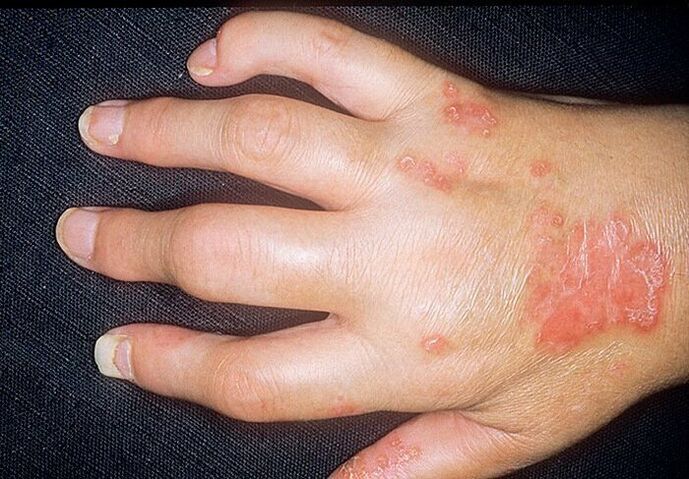
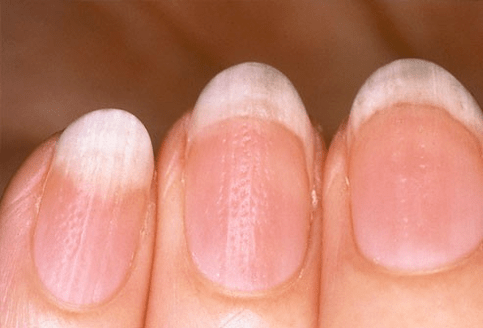
As you can see, this disease is very dangerous, so treatment should be started as soon as possible to prevent it from spreading to other organs and systems.
Psoriasis contagious?
Since the disease is non-infectious and non-viral in nature, it is not infectious at all. The only way of transmission of the disease is genetic susceptibility caused by inheritance.
Types of psoriasis
There are several variants of this disease, each with its own course characteristics and characteristic symptoms.
- Simple/vulgar/plaque/plaque/common. According to the International Classification of Diseases-Prosiasis Vulgaris. This form is more common than others: it is associated with psoriasis vulgaris in approximately 80-90% of disease cases. It is characterized by the appearance of "paraffin lake" or psoriasis plaque.
- Inverse (psoriasis inverse). This type of disease mainly affects the folds of the skin, the outer surface of the thigh, and the groin area with external genitalia. The main difference between adversarial psoriasis and ordinary psoriasis is that in the opposite condition of this disease, no plaques are formed on the skin: the skin becomes covered with red spots, accompanied by an inflammatory process. The risk of psoriasis adversity develops with the development of sweat and friction. Therefore, the infection can form microcracks on the skin. As a result, it may cause skin damage caused by cocci and fungi.
- It is water drop-like (according to ICD-Gingival Psoriasis). It differs from other variants in that the rash with teardrop psoriasis does not merge into large plaques. The patient's body was covered with small spots (hence the name) similar to drops, and their colors ranged from pink to purple.
- Pustules/exudates. If other types of diseases are characterized by areas of dry skin, pustules or exudative psoriasis can be identified by crying blisters filled with clear liquid. In this case, the skin around the blisters will usually become red and the local temperature will increase. If the blisters rupture or the patient grooms them, there is a risk of infection and subsequent suppuration-this is the main risk of pustular disease.
- Psoriasis erythroderma. This is one of the most serious forms of disease, and if the course of the disease is unfavorable, it may lead to death. Its unique feature is skin shedding, as a result of which pathogenic microbial infections may occur. The first symptoms and signs of this disease-psoriasis is severe skin itching, small red rash with white scales, swollen lymph nodes, tissue swelling and overall body temperature rise to 38-39 degrees. It is divided into systemic and allergic types.
- Seborrheic psoriasis. This disease usually affects the scalp, but in some cases it may involve the nasolabial folds, the skin near the auricle, and the shoulder blade area. It is characterized by the appearance of dandruff (when located on the head), severe itching and light gray flowers.
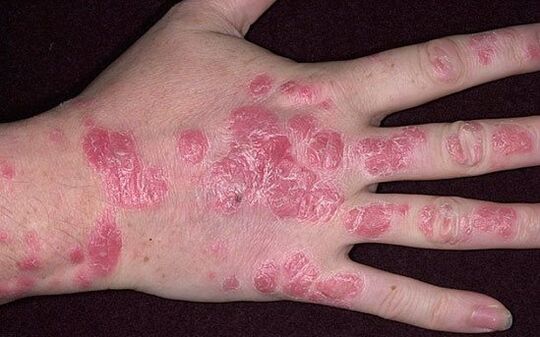
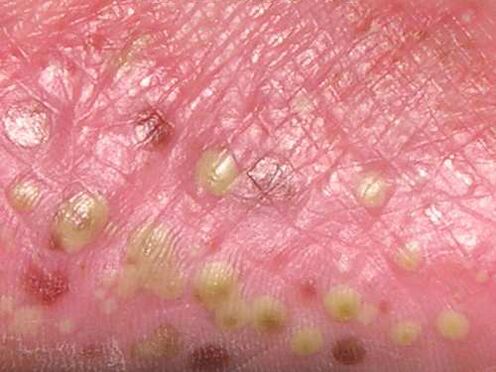
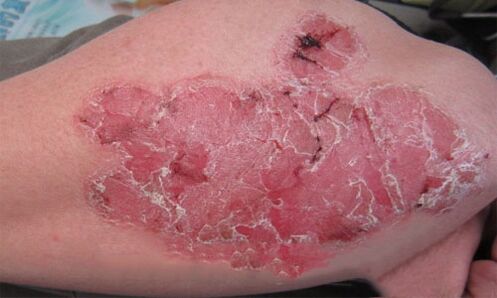
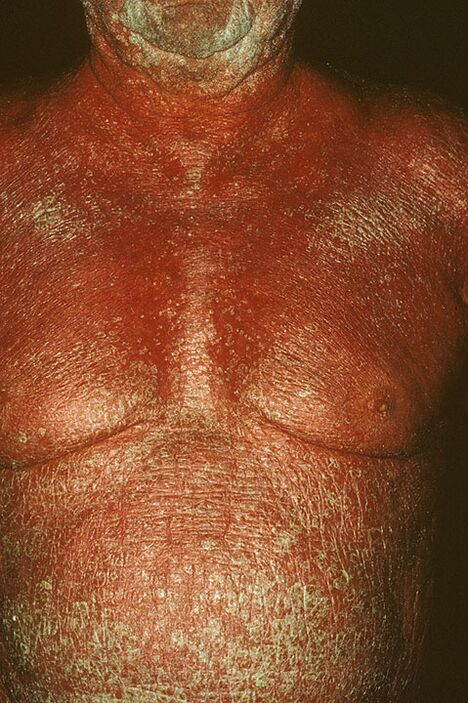
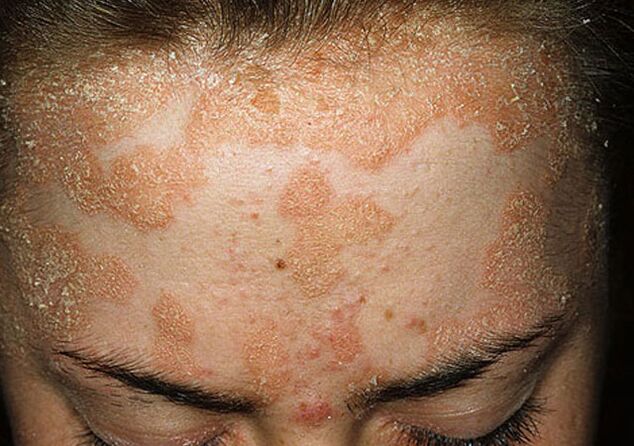
Increased psoriasis
The disease is characterized by a chronic ups and downs process, accompanied by periods of deterioration and remission. A decrease in the intensity of symptoms is usually observed in the warm season, while the disease worsens in winter and autumn.
The factors that cause the disease to worsen may be:
- Stress, anxiety.
- Unbalanced work and rest schedules.
- Weakness of the body after suffering an infectious or viral disease.
- Hormones rise sharply.
- Take some medications.
- Use inappropriate cosmetics.
- Skin contact with household chemicals.
- Abnormal organ system function.
- Exposure to too dry, hot or cold air.
- Strong personal hygiene is not guaranteed.
- Bitten by insects.
- Exacerbate allergic reactions.
- Wear tight synthetic clothing.
- Shift to an abnormal climate.
Any aggravation of skin diseases (including psoriasis) will bring great discomfort to the patient-not only physical discomfort, but to a large extent psychological discomfort. The quality of life of patients with severe psoriasis in the acute phase is significantly reduced.
Psoriasis patients usually encounter great difficulties and social adjustment problems, which may have a negative impact on work/school/personal life. A person refuses to contact others and would rather spend most of his time alone. As a result, he develops social anxiety, which can develop into severe depression over time.
The worsening of the disease may lead to the fact that patients have difficulty taking care of themselves and their loved ones, living a normal life or even sleeping. If the rash is on the genital area, it may cause physical and mental discomfort and cause the partner to refuse intimacy.
Severity of disease
Depending on the affected skin area and the extent to which the disease spreads to the joints, nails and internal organs, mild, moderate and severe disease will be emitted.
- When the total area of the lesion is about 3%, the mild form means slight damage to the skin.
- A failure of 3% to 10% of human skin is considered the average severity of the disease.
- Severity means obvious skin lesions-10% or more of the total skin area.
If it is diagnosed that the patient’s joints, muscles and internal organs are damaged, even if there are actually no plaques and pimples on the body, we are talking about a serious disease.
How to eliminate psoriasis: treatment
The problem of always curing psoriasis is a concern for all people suffering from this disease. Fighting with the external manifestations of the disease is only a temporary result. Therefore, in order to make the effect lasting, it is important to eliminate the cause of psoriasis. This usually takes a lot of time-up to several years. The patient must be patient, but only in this case can he expect long-term results.
Let's take a look at how to treat psoriasis through medication, hormone therapy, phototherapy, and exercise. We will also turn to folk remedies to treat psoriasis-combined with traditional therapies, traditional medicine can produce significant results.
Treat psoriasis with medication
After discovering a suspicious round rash, increased dryness, and peeling of your or your loved one’s skin, the first thing to do is to seek qualified medical help. Only a dermatologist can determine exactly which skin lesions are occurring in your particular situation. Remember: Do not self-administer medication under any circumstances, because lack of treatment or self-selected medication may cause serious harm to your health.
The disease can usually be diagnosed without tests or skin tests. The doctor only needs to see the skin covered with pimples or plaques to determine the cause. If the disease is in a severe form, a dermatologist can prescribe a referral method-routine and biochemical studies of blood and urine, and in particularly difficult cases, a skin biopsy may be required. X-rays may also be required to diagnose psoriatic arthritis.
There are several effective treatments for psoriasis. The choice of an appropriate treatment plan depends on the degree of damage to the skin, joints, nails and the intensity of the disease progression. Usually, the best option is to choose a comprehensive treatment plan that includes the use of topical and internal therapies, the use of ultraviolet radiation, bathing in salt and soda water baths, and physical therapy.
In order to eliminate the itching and peeling of damaged skin, creams, gels, ointments, sprays and lotions can be used. They can be prepared based on salicylic acid, pyrithione, tar and other active ingredients. The main tasks of hormonal and non-hormonal topical preparations are to soften psoriasis plaques, disinfect, eliminate inflammation, and moisturize and nourish the affected skin area.
Among the drugs for oral treatment of human psoriasis, there are drugs based on efaribam, γ-D-glutamyl-D-tryptophan sodium, and the like.
The positive results of skin psoriasis treatment make sea rest. At the same time, it is recommended to choose a resort with a relatively mild and warm climate. The ideal solution is to treat in specialized nursing homes and spas, and the remaining treatments are for complex treatment of psoriasis.
Psoriasis: home treatment
Psoriasis can be treated through family and folk remedies only when it is used as an adjuvant therapy to supplement the main drug treatment. In addition, if the patient has an allergic reaction to the medicine, he can bet on the formula of the traditional medicine. But in any case, the treatment of psoriasis should be determined by the doctor, so if you want to use this or another folk method, be sure to consult a dermatologist.
One of the most common traditional medicines for psoriasis is the use of baking soda. Sodium bicarbonate has a softening effect on psoriasis spots, can soften rough skin, reduce itching and improve waste removal. On the basis of soda water, self-made ointments, bath lotions, oral soda water, dressings and lotions.
Moreover, salt bath is an effective way to treat the disease. If patients do not have the opportunity to travel to sea, they will become a worthy choice.
Celandine juice applied to psoriasis plaques can also produce positive results. However, you need to remember that this therapy is very radical, so you need to make sure that the juice does not enter the healthy areas of the skin.
Walnut shells are also used to fight psoriasis plaques. Pour the shell into boiling water, then stick, filter the resulting infusion and add it to the warm water bath. This therapy is particularly effective during the worsening of the disease.
How does the diet cure psoriasis?
Adequate nutrition plays an important role in all skin conditions, and psoriasis is no exception. Of course, a balanced diet cannot cure psoriasis 100%, but it works well when combined with medicines and traditional medicines.
During treatment and to extend the remission period, the doctor recommends that you abstain from alcohol, smoked and salty foods, fatty and spicy foods, use artificial flavors, preservatives, emulsifiers and chemical dyes, fatty meat, mayonnaise, ketchup. It is also recommended to reduce the intake of salt, refined sugar, chocolate and other sweets and citrus. Doctors recommend focusing on low-fat fermented dairy products, plant-based foods, grains, lean meats and fish.
Despite the fact that it is desirable to reduce fat consumption during dieting, it is unreasonable to give up them altogether. You only need to substitute vegetable oils for animal fats-olives, flaxseed, corn, sunflower.
Prevent psoriasis
The treatment phase of psoriasis must include a remission phase. It is important to extend these times as much as possible. To this end, patients must comply with many disease prevention rules:
- Avoid stressful situations.
- Eat a balanced diet.
- Refuse to wear tight clothes made of wool and synthetic materials.
- Spend enough time outdoors.
- Ensure adequate rest and adequate sleep.
- Take care of your skin.























